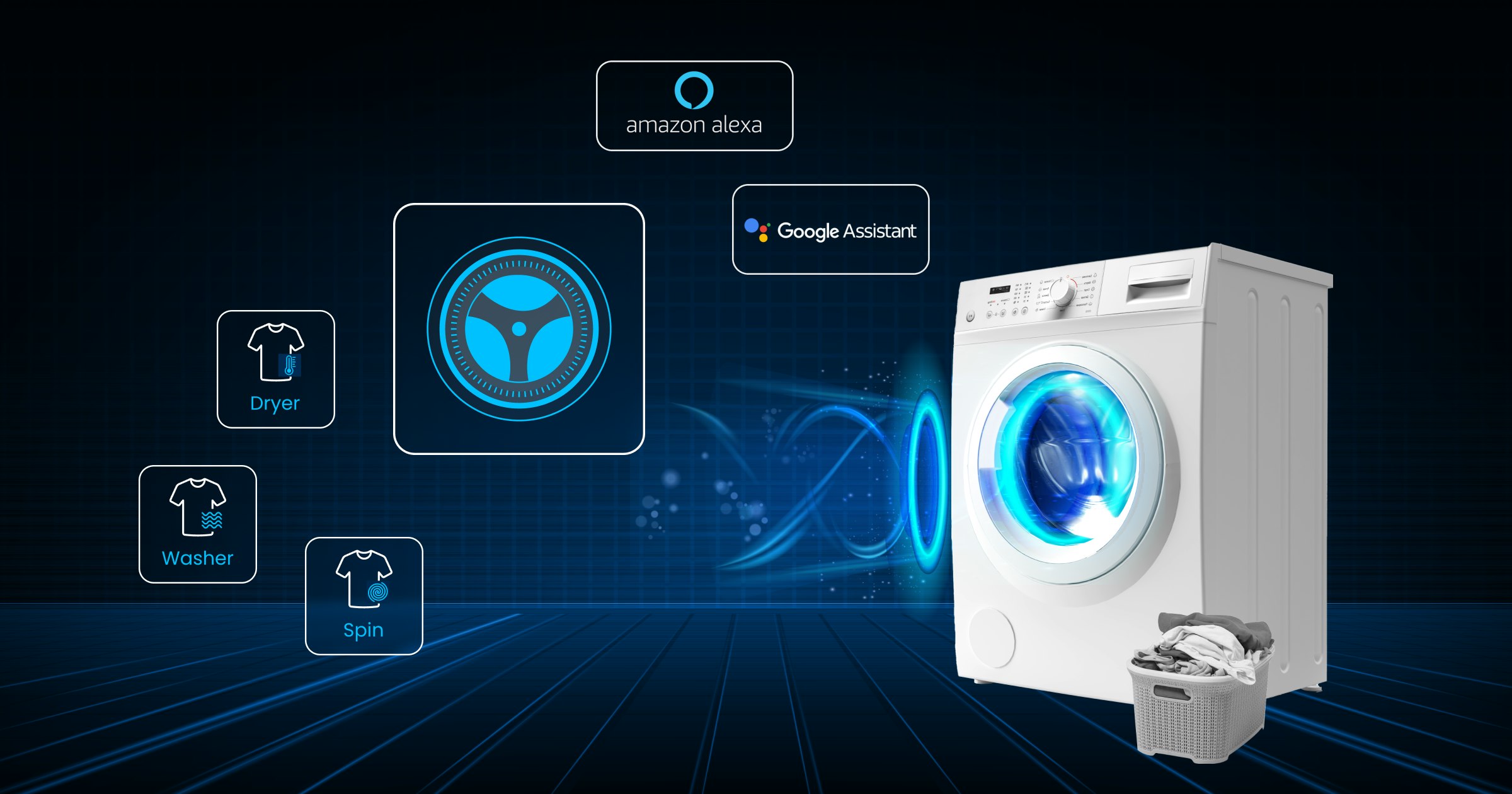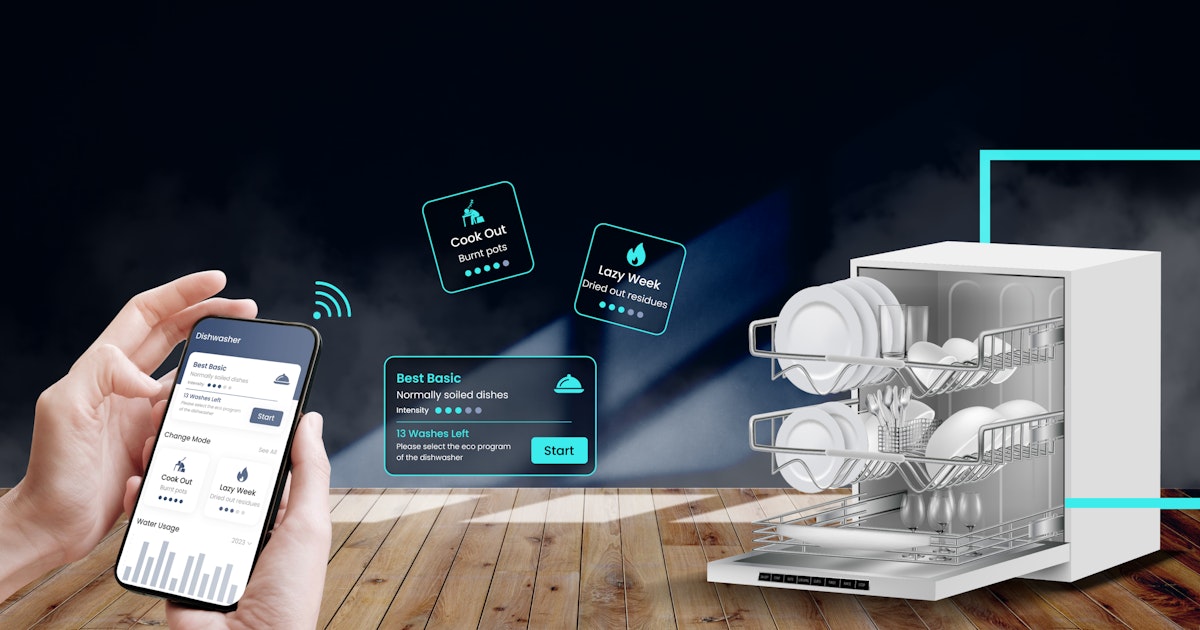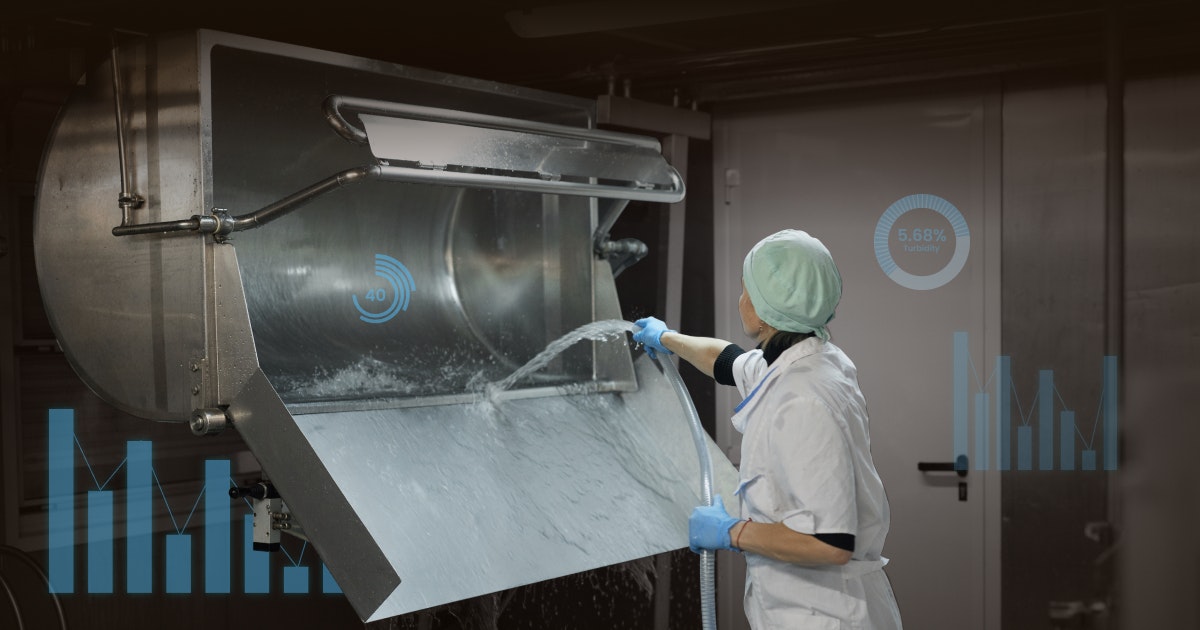Table of Content
According to a report released by Smart Home Statistics, 41% of households make use of smart appliances. The performance of the wash cycle is improved, and these appliances provide real-time machine status updates, remote control capabilities, incident detection, maintenance alarms, and intelligent data analytics, revolutionizing how we do laundry. To showcase the world of smart washing machines, this blog will examine their features and how they change how families do their laundry worldwide.
What Is a Smart Washing Machine?
A smart washing machine using IoT (Internet of Things) is an advanced appliance that connects to the internet and can be controlled remotely via a smartphone app or other smart home devices.
These machines typically feature sensors that monitor various aspects of the washing process, such as water usage, detergent levels, and cycle progress. They can send notifications to your phone when a cycle is complete or if there's a problem.
Some models can automatically order detergent when supplies run low, adjust settings based on the type of clothes being washed, or optimize energy usage by running during off-peak hours. The IoT functionality allows for greater convenience, efficiency, and customization in laundry care.
Unlike traditional washing machines, smart models have sensors, internet connectivity, and cognitive capabilities that allow automatic operation. These appliances are engineered to function at their peak for quick, convenient laundry care and individualized choices.
OEMs can offer options like start, stop, or pause cycles, change settings, and get real-time reports on the machine's status through smartphone apps or voice commands with virtual assistants like Google Assistant or Amazon Alexa.
Let Our IoT Experts Elevate Your Washing Machine Line!
Explore SolutionsSmart washing machine features
These below features can offer the best balance of user convenience, energy efficiency, and machine longevity, making them the most relevant and efficient for most consumers.
Remote control
Allows users to start, stop, or monitor wash cycles from anywhere using a smartphone app, significantly enhancing convenience and time management.
Load detection
Sensors determine the size and weight of each load, automatically adjusting water and energy use for optimal efficiency and cleaning performance.
Energy monitoring
Tracks and displays energy consumption for each cycle, helping users optimize their usage and reduce electricity bills, promoting both cost savings and environmental consciousness.
Custom cycle programming
Enables users to create and save personalized wash programs tailored to specific needs or fabric types, improving cleaning effectiveness and garment care.
Maintenance alerts
Sends notifications about necessary maintenance like cleaning cycles or filter replacements, ensuring the machine operates at peak performance and prolonging its lifespan.
IoT Use Cases in Smart Washing Machines
OEMs continually promote intelligent technologies into home appliances like washing machines. Following are a few instances of smart technologies that are frequently seen in washing machines:
1. Connectivity
Washing machines may have Bluetooth or Wi-Fi connectivity, enabling them to connect to wireless networks at home or on mobile devices. Through specialized smartphone apps or voice assistants, this connectivity makes remote control, monitoring, and additional functionality possible.
2. Smart Controls
Modern washing machines frequently use intelligent touchscreens or control panels with user-friendly interfaces. These controls allow access to numerous settings, wash programs, and cycle customization possibilities.
3. Voice Control
Washing machines can be voice-operated by incorporating virtual assistants like Amazon Alexa or Google Assistant. Users can use voice commands without touching the machine to start, halt, or stop wash cycles, adjust settings, or get status reports.
4. Smart Diagnostics
Some washing machines include built-in sensors and diagnostic systems that automatically identify and fix problems. In addition to warning customers about potential issues, including water leaks, imbalanced loads, or malfunctions, these devices can also provide error codes for faster troubleshooting.
5. Load Sensing and Auto-Dispensing
Thanks to intelligent load-sensing technologies, washing machines can now automatically determine the amount and weight of the laundry load. Using this data, the appliance is capable to modify the water levels, detergent dose, and cycle length to produce the best washing results with the least waste.
6. Real-time Notifications
Smart technology-enabled washing machines can notify or push notifications to users' mobile devices. Users can receive messages regarding the cycle's progress, completion, or any problems that need fixing, keeping them informed even when they are away from the machine.
7. Data Analytics and Machine Learning
Some washing machines utilize machine learning and data analytics to examine usage trends and user behavior. Personalized recommendations, wash cycle optimization, and maintenance action suggestions can all be made with the help of this data.
Upscale the art of cooking with an IoT-enabled Smart Oven
Read NowIoT sensors used in smart washing machines
Water level sensors
Monitor and adjust water levels for optimal cleaning and efficiency based on load size.
Temperature sensors
Measure and maintain water temperature for different wash cycles and fabric types.
Weight sensors
Detect the weight of the laundry load to optimize water and detergent usage.
Vibration sensors
Monitor machine vibrations to detect imbalances and adjust spin cycles accordingly.
Flow meters
Measure water flow rates to ensure proper filling and draining.
Detergent level sensors
Monitor detergent levels in auto-dispensing systems and alert when refills are needed.
Turbidity sensors
Measure water clarity to determine soil levels and adjust wash cycles.
Advantages of Smart Washing Machines
Revolutionizes the laundry experience: Smart washing machines bring convenience, energy efficiency, and improved machine quality to the laundry process. OEMs can promote a hassle-free laundry experience with remote control and monitoring, customized wash cycles, and real-time machine status updates.
1. Consistent Performance
Smart washing machines are designed to maintain consistent performance even under varying loads. By automatically adjusting water levels, temperature, detergent usage, and washing time, these machines ensure optimal cleaning results regardless of the load size or fabric type.
2. Sensor-Based Load Selection
Smart washing machines can automatically detect the load category and water level with sensor-based technology. This enables the machine to select the appropriate wash cycle and settings, saving users time and effort in manual selection.
3. Minimize Cycle Time
Smart washing machines have intelligent algorithms that calculate the minimum cycle time required to wash clothes effectively. This saves time and reduces energy consumption, contributing to overall energy efficiency.
4. Effective Wash Range
Temperature plays a crucial role in the washing process. Users can select the ideal temperature for their clothing using smart washing machines' range of temperature options. This ensures effective stain removal and thorough cleaning.
5. Connectivity Options
Smart washing machines come with built-in Wi-Fi or Bluetooth connectivity. This enables users to control and monitor their machines using a smartphone app remotely. Whether starting, stopping, or pausing a cycle, users have full control over their laundry even when not physically present.
Bluetooth vs. WiFi — Which Is Better For Connectivity For IoT Development?
Read NowAdvantages of smart washing machines for manufacturers/OEMs
IoT-enabled smart washing machines offer manufacturers crucial benefits: data-driven innovation, reduced maintenance costs, remote servicing, personalized user experiences, new revenue streams, and market differentiation. Explore them in brief.
Gather user insights to drive product innovations
By collecting data from smart washing machines, manufacturers gain insights into user behavior and product performance. For instance, they might discover that users frequently select eco-modes, prompting design improvements for water and energy efficiency. This data-driven approach leads to better products and increased customer satisfaction.
Reduce maintenance costs with predictive maintenance
IoT-enabled predictive maintenance allows manufacturers to monitor machine health remotely. For example, sensors might detect unusual vibrations in the drum, indicating potential bearing failure. By addressing this proactively, manufacturers reduce downtime, extend product lifespan, and cut warranty costs, improving both customer experience and profitability.
Solve Issues Instantly with remote diagnostics and updates
Remote diagnostics and updates empower manufacturers to enhance products without physical intervention. For instance, a firmware update could optimize spin cycles for better performance. This reduces on-site technician visits and allows rapid deployment of new features, like a specialized cycle for athleisure wear, keeping the product competitive.
Delight customers with personalized laundry experience
Smart washing machines offer users a more personalized and convenient laundry experience through app-based controls, notifications, and cycle recommendations. By enhancing user interaction and simplifying the laundry process, manufacturers can boost customer satisfaction, foster brand loyalty, and differentiate their products in a crowded market.
Unlock new revenue streams
IoT connectivity opens up new revenue streams beyond the initial product sale. Manufacturers can offer premium subscription services, sell digital upgrades or add-on features, and create targeted marketing campaigns for consumables like detergents, presenting opportunities for ongoing monetization throughout the product's lifecycle.
Stand out in the market with smart features
By incorporating smart features and IoT connectivity, manufacturers can differentiate their products in a competitive market. These advanced functionalities appeal to tech-savvy consumers, justify higher price points, and position the brand as an innovator in the appliance industry, potentially increasing market share and profitability.
The Future of Smart Washing Machines
Original equipment manufacturers (OEMs) have several exciting opportunities to offer in the future of smart washing machines. Smart washing machines will become more advanced as technology develops, delivering more features and capabilities. The following trends and developments may affect how smart washing machines develop in the future:
1. Advanced Sensors and AI
Modern sensors and artificial intelligence (AI) algorithms will be used in future washing machines to enhance washing performance. AI algorithms will continuously learn from them to make recommendations for each user and their washing habits.
2. App-based Interfaces and Smart Features
Manufacturers will provide specialized mobile apps with a simple user interface for managing and controlling washing machines. Additional benefits these apps offer include cycle histories, maintenance warnings, and detergent reordering reminders.
3. Advanced Washing Technologies
OEMs will keep developing washing technologies to give better cleaning results. This could involve improvements in ultrasonic, steam, or other novel stain-removal, fabric-damage-reduction, and overall washing-out results.
Understanding the IoT Use Cases in Smart Dishwashers
Read NowConclusion
At Intuz, we truly believe in the incredible impact that IoT technology can have on smart washing machines and household chores. As an OEM, you can place your trust in us for exceptional services and unwavering support.
If you are a washing machine manufacturer and want to transform washing machines into intelligent appliances with IoT:
Book Your Free 45-minute Consultation with Our IoT Experts Today!
During this personalized consultation, you will get:
No-cost IoT readiness assessment tailored to your washing machines
Insights on IoT sensors, connectivities, and cloud integration for advanced data collection and analytics
Strategy for a IoT mobile app to remotely control and monitor your washing machines
Detailed IoT implementation roadmap for seamless integration






